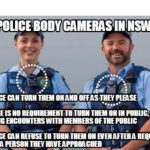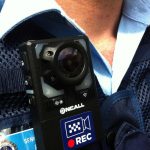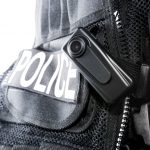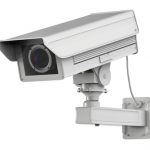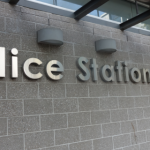Police Caught Planting Evidence
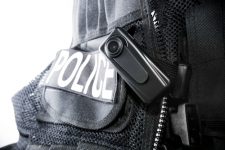
Two different groups of Baltimore police officers have been accused of planting evidence at supposed crime scenes, after incriminatory body camera footage came to light.
The videos have forced Baltimore prosecutors to drop dozens of cases involving one of the officer’s involved, while many other cases are still under review.
The incidents not only raise concerns about police impropriety, but the potential for misuse of police body cameras generally.
The evidence
The first video relates to an incident in January of this year, where police officer Richard Pinheiro is seen placing a bag of pills under trash in an alley-way. The officer then walks away, switches his body camera on and walks back to ‘discover’ the drugs he just planted.
Officer Pinheiro was only detected because he forgot that the body camera back-records 30 seconds of footage; in other words, tapes the period immediately preceding its manual activation. This is also a feature of body cameras used in NSW.
Unfortunately for the officer, 30 seconds was enough to record him planting the fake evidence, walking away, switching the camera on and uncovering it.
The second video, released by the Baltimore public defender’s office, depicts officers searching a car and finding nothing, at which point they turn their body cameras off. The cameras are later turned and then record an officer finding a bag of drugs in a location where it was evident from the footage that there was previously no such bag.
An eye-witness later gives a statement that an officer leaned into the car in the interim, supporting the inference that drugs were planted when the cameras were turned off.
Position of police
Baltimore Police Commissioner Kevin Davis says the officers involved in the second incident are innocent until proven guilty, suggesting that all of the officers’ body cameras could have been turned off due to “growing pains” rather than anything sinister.
“I do know it’s not healthy to jump to a conclusion that officers did something criminal just because their camera was off,” Commissioner Davis said, adding that he would await the findings of an internal investigation before passing judgment.
Ramifications
When the first video came to light, the charges against the man accused of “stashing” the drugs were withdrawn, and state prosecutors began examining 123 other cases involving the officer in question and two of his colleagues.
Of those cases, 41 were formally withdrawn due to questions surrounding the reliability of the evidence gathered.
The incidents have broader ramifications regarding the reliability of evidence depicted in footage from police body cameras, with suggestions that the cameras are being used by dishonest officers to bolster the weight of tenuous and even manufactured evidence, rather than to keep both police and members of the public accountable.
Unrealised potential
In 2015, US President Barack Obama promised funding to introduce police body cameras in all US states, hoping the devices would lead to better relations between police and the public.
In the same year, an investigation into the use of body cameras in Phoenix, Arizona found that only 20 to 29% of incidents that should have been recorded, were in fact recorded.
And in the previous year, Denver’s Office of the Independent Monitor found that less than half of use-of-force incidents involving officers wearing body cameras were recorded, as the cameras were either turned off or were said to have experienced technical problems.
The central issue seems to be that officers are simply not turning their cameras on when they are executing their duties, as they are required to do under police policies and guidelines to.
Rather, they are often only being turned on when police feel it suits them, which allows rogue officers to continue using heavy-handed tactics, and can even help them to get away with criminal conduct.
Broader racial Issues
The Baltimore Police Force has faced widespread criticism in recent years, with a 2016 investigation by the US Department of Justice uncovering widespread misconduct and racial discrimination at every level.
“Racially disparate impact is present at every stage of [the Baltimore Police Department’s] enforcement actions, from the initial decision to stop individuals on Baltimore streets to searches, arrests, and uses of force,” the investigation found.
“These racial disparities, along with evidence suggesting intentional discrimination, erode the community trust that is critical to effective policing.”
Among many other things, the investigation found that police regularly exercise stop and search powers against minorities without sufficient reason, and therefore unlawfully. It also found that unfounded charges are far more frequently brought against minorities. Black people were found to be the biggest targets.
The investigation examined five and a half years of data, finding that black residents accounted for 95 percent of the 410 individuals stopped at least 10 times. Black people were also disproportionately stopped for trivial offences such as loitering and trespassing.
In one case, a police sergeant directed a patrol officer to stop and search a group of young black men. When the patrol officer protested, saying there was no valid reason for the stop, the sergeant said, “Then make something up”.
The treatment of minorities is inconsistent with findings that police discovered contraband twice as often when searching white individuals than blacks during vehicle stops, and 50% more often during pedestrian stops.
In NSW
The NSW Police Force announced in 2014 that it had invested over $4 million to roll out body cameras to all frontline officers, after what the NSW police minister described as “very positive results” from (unpublished) trials.
Indeed, police are now meant to turn the cameras on when in the execution of their duties, including when they are conducting stops and searches.
The concern, of course, is that police officers will only use the cameras sparingly and for their own purposes, rather than consistently during confrontations with members of the public.


